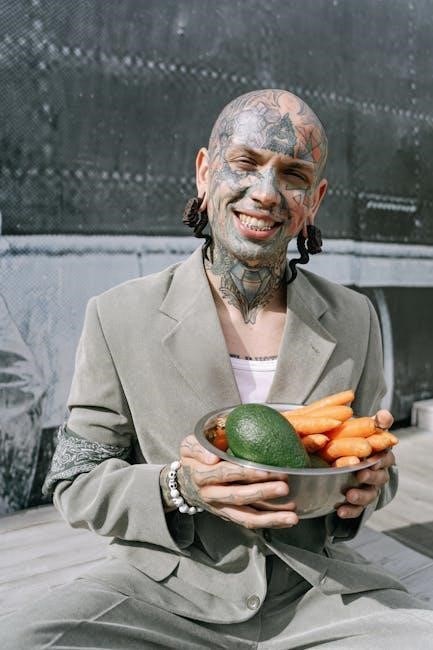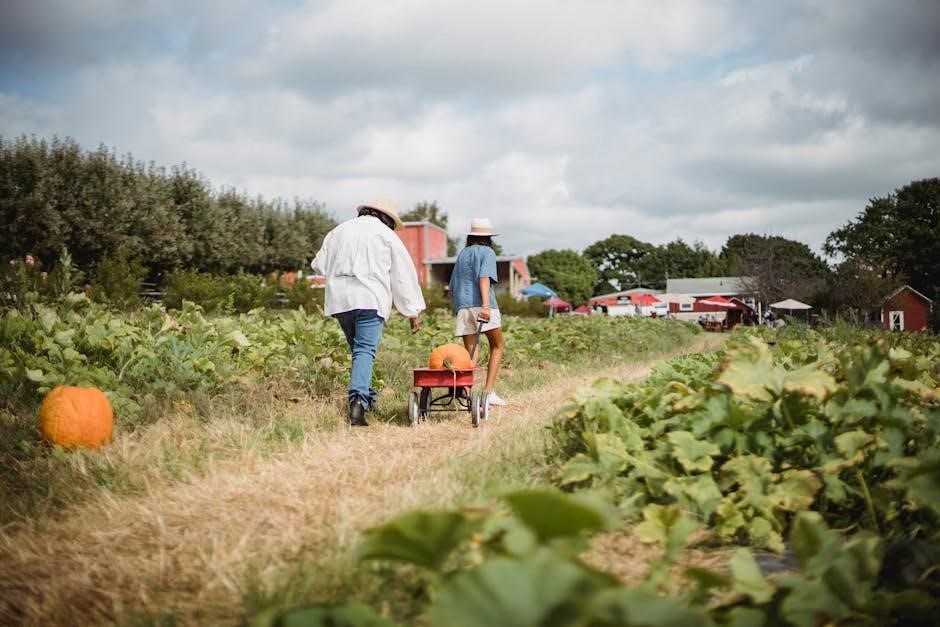Seth Holmes, a physician and anthropologist, explores the harsh realities of migrant farmworkers in the U.S. in Fresh Fruit, Broken Bodies, revealing the human cost behind fresh produce.
1.1 Overview of the Book and Its Author
Fresh Fruit, Broken Bodies is a compelling ethnographic study by Seth Holmes, a physician and medical anthropologist. The book examines the lives of Mexican migrant farmworkers, focusing on the Triqui people from Oaxaca, Mexico. Through five years of fieldwork, Holmes lived and worked alongside these laborers, uncovering the structural violence and exploitation embedded in the U.S. food system. His dual expertise as a healthcare provider and anthropologist offers a unique perspective on the physical, mental, and social tolls faced by these workers, shedding light on the human cost behind America’s fresh produce.
1.2 The Significance of the Title
The title Fresh Fruit, Broken Bodies poignantly reflects the paradox of the food industry. While fresh produce symbolizes health and vitality, it often comes at the cost of workers’ physical and mental well-being. The term “broken bodies” highlights the exploitation and suffering of migrant laborers, whose bodies bear the brunt of grueling work conditions. This contrast underscores the ethical and social dilemmas embedded in the production of food, urging readers to confront the human sacrifices behind their daily meals. The title serves as a call to acknowledge and address these systemic injustices.

The Lives of Migrant Farmworkers
Migrant farmworkers endure grueling conditions, facing exploitation and marginalization. Their resilience in the face of poverty and injustice underscores the harsh realities of their daily existence.
2.1 Daily Struggles and Exploitation
Migrant farmworkers face exhausting labor, minimal rest, and inadequate pay, trapped in a cycle of exploitation. Their bodies bear the physical toll of relentless work, while systemic economic structures perpetuate their suffering. Poor living conditions, lack of access to healthcare, and limited legal protections exacerbate their vulnerability. Seth Holmes highlights how these workers, often indigenous migrants, are treated as expendable in the food system. Their daily struggles reflect deeper structural inequalities, rooted in racial and citizenship-based hierarchies that devalue their humanity. Their exploitation is both a moral and public health crisis.
2.2 The Triqui People of Oaxaca: A Case Study
The Triqui people, an indigenous group from Oaxaca, Mexico, are central to Seth Holmes’ ethnographic research. They migrate to the U.S. to work in agriculture, facing severe exploitation and racism. Holmes lived among them, documenting their relentless labor, poor living conditions, and limited access to healthcare. Their bodies endure immense physical strain, reflecting the human cost of cheap labor in the food system. This case study exposes how systemic inequalities and dehumanizing conditions perpetuate their suffering, making them invisible in the production of fresh produce consumed daily.

Structural Violence in the Food System
Seth Holmes examines how economic systems and policies perpetuate inequality, causing structural violence against migrant workers, whose exploitation underpins the production of fresh produce for consumer benefit.
3.1 Economic Exploitation and Labor Hierarchies
Fresh Fruit, Broken Bodies reveals how migrant workers face economic exploitation through low wages, long hours, and hazardous conditions. Labor hierarchies on farms marginalize undocumented workers, often Triqui indigenous migrants, who endure the most grueling tasks for the least pay. These systems perpetuate inequality, with workers trapped in cycles of poverty despite their essential role in producing fresh produce. Holmes highlights how market forces and farm policies normalize this exploitation, embedding suffering into the food system’s structure. This economic violence disproportionately affects vulnerable groups, perpetuating systemic injustice.
3.2 Racial and Citizenship-Based Discrimination
In Fresh Fruit, Broken Bodies, Seth Holmes examines how racial and citizenship-based discrimination exacerbates the exploitation of migrant workers. Triqui migrants, often of indigenous descent, face compounded marginalization due to their race and undocumented status. This discrimination is embedded in labor hierarchies, with workers of color and non-citizens assigned the most dangerous and poorly paid jobs. Holmes argues that these systemic inequalities are perpetuated by policies and societal norms, further entrenching the dehumanization of migrant workers in the food system. This intersectional oppression highlights the need for systemic change to address their suffering.

Health Impacts on Migrant Workers
Migrant workers face severe physical strain, including back pain and bodily exhaustion. Mental health suffers due to stress and isolation. Their daily labor directly impacts their health and well-being.
4.1 Physical Toll of Farmwork
Migrant farmworkers endure immense physical strain, with repetitive labor causing musculoskeletal injuries and chronic pain. Prolonged bending, lifting, and exposure to harsh weather lead to long-term health issues. The relentless pace of harvesting, often without adequate rest, accelerates bodily exhaustion. Workers frequently suffer from back injuries, joint pain, and repetitive strain injuries. Environmental hazards, such as extreme temperatures and pesticide exposure, further exacerbate physical deterioration. These conditions underscore the profound sacrifices made by farmworkers to supply fresh produce, often with limited access to healthcare or relief.
4.2 Mental and Emotional Suffering
Migrant farmworkers face profound mental and emotional distress due to their harsh working conditions and precarious lives. The stress of relentless labor, separation from families, and uncertain futures contributes to anxiety and depression. Many workers experience feelings of isolation and hopelessness, exacerbated by poor living conditions and limited access to mental health support. The trauma of exploitation and discrimination further compounds their emotional pain, creating a cycle of suffering that is often overlooked in the broader discussion of labor rights and food production.
Seth Holmes’ Ethnographic Research
Seth Holmes conducted five years of immersive fieldwork among Triqui migrants, blending his roles as a physician and anthropologist to deeply understand their experiences and struggles.
5.1 Living and Working with Migrant Workers
Seth Holmes immersed himself in the lives of Triqui migrants, living and laboring alongside them. He participated in berry picking, experiencing the physical toll and emotional strain firsthand. By sharing their daily struggles, Holmes gained profound insights into their resilience and the systemic challenges they face. His dual role as a physician and anthropologist allowed him to document their experiences with authenticity and depth, providing a unique perspective on their lives and the broader structural issues affecting migrant workers.
5.2 Insights Gained from Five Years of Fieldwork
Seth Holmes’ five years of fieldwork revealed the profound impact of structural violence on migrant workers. He documented how economic systems, racial discrimination, and immigration policies perpetuate their suffering. By living alongside the Triqui people, he witnessed firsthand the physical and emotional toll of their labor. Holmes’ research highlights the human cost behind the production of fresh produce, emphasizing the need for systemic change. His work underscores the importance of understanding the interconnectedness of food systems, labor exploitation, and human health, urging a reevaluation of ethical consumption and policy reform.

The Role of Market Forces and Policy
Market forces and policies drive exploitation, creating labor hierarchies and normalizing inequality. These systems perpetuate suffering, linking economic gain to the human cost of fresh produce production.
6.1 How Economic Systems Perpetuate Suffering
Economic systems create inequality by relying on cheap, exploited labor to maintain profitability. In the agricultural sector, migrant workers, often from marginalized communities, face systemic oppression. The demand for low-cost produce fuels a hierarchy that devalues workers’ lives, normalizing their suffering. This structure ensures that economic gains are prioritized over human well-being, perpetuating cycles of poverty and illness. The exploitation is further entrenched by policies that fail to protect these workers, highlighting the urgent need for systemic reforms to address the root causes of their suffering.
6.2 The Impact of Immigration Policies
Immigration policies significantly contribute to the exploitation of migrant workers by creating conditions of vulnerability. These policies often fail to protect workers’ rights, allowing farm owners and labor contractors to take advantage of their precarious legal status. This leads to poor working conditions, low wages, and inadequate access to healthcare. As a result, migrant workers face severe physical and mental health issues, perpetuating a cycle of inequality and suffering within the agricultural industry, as exposed in ‘Fresh Fruit, Broken Bodies.’
Consumer Awareness and Responsibility
Consumers play a crucial role in demanding ethical labor practices by supporting fair-trade products and advocating for workers’ rights, fostering a more equitable food system.
7.1 The Journey of Fresh Produce to Your Plate
The journey of fresh produce to consumers’ plates is often obscured, hiding the exploitation of migrant workers. From fields to distribution centers, fruits and vegetables travel long distances, yet the labor behind their cultivation remains invisible. Consumers unknowingly support systems that perpetuate suffering, as the produce’s path is marked by structural violence and economic inequality. This invisibility underscores the disconnect between the food system’s exploited workers and the consumers who benefit from their labor, highlighting the need for greater awareness and ethical consumption practices.
7.2 The Power of Ethical Consumption
Ethical consumption offers a pathway to transform the food system by holding producers accountable for fair labor practices. By choosing produce from ethical sources, consumers can reduce exploitation and support dignity for migrant workers. Awareness of the human cost behind fresh produce empowers individuals to demand change. Ethical consumption not only promotes justice but also fosters a more equitable food system, encouraging corporations to prioritize workers’ rights over profit. This collective action can drive systemic change, ensuring that the journey of fresh produce to our plates is free from suffering and exploitation.
Advocacy and Policy Change
Advocacy efforts highlight the need for systemic reforms to improve migrant workers’ conditions. Policy changes must address exploitation, ensuring fair wages and safer working environments for farmworkers.
8.1 Current Efforts to Improve Workers’ Conditions
Various organizations and advocacy groups are working tirelessly to enhance the lives of migrant farmworkers. These efforts include pushing for better wages, safer working conditions, and access to healthcare. Legal reforms and public awareness campaigns are also being implemented to address the systemic issues faced by these workers. The goal is to create a more equitable and just food system that values the well-being of those who cultivate it.
8.2 The Need for Systemic Reforms
Addressing the plight of migrant farmworkers requires more than just incremental changes. Fundamental systemic reforms are essential to dismantle the structures that perpetuate exploitation. This includes rewriting labor laws, enforcing stricter regulations, and challenging the economic systems that profit from cheap labor. Without comprehensive policy changes, the cycle of poverty and suffering will continue. Advocates emphasize the need for a food system that prioritizes human dignity and fairness over profit, ensuring that workers’ rights are protected and their contributions valued.
Fresh Fruit, Broken Bodies exposes the exploitation inherent in the food system, urging systemic change to prioritize human dignity over profit and ensure a fairer future for all.
9.1 The Urgent Need for Transformation
The book emphasizes the critical need for systemic change in the food industry to address exploitation and inequality. Holmes highlights how market forces perpetuate suffering, advocating for ethical practices and policy reforms. He calls for a shift in consumer awareness and responsibility, urging individuals to recognize the human cost behind their food. Transformation requires dismantling structural violence and fostering a system that values workers’ rights and well-being over profit. The urgency lies in creating a fairer food system for all.
9.2 A Call to Action for a Fairer Food System
Holmes urges systemic reforms to address exploitation in agriculture, emphasizing the need for ethical practices and policy changes. Consumers, policymakers, and health professionals must advocate for workers’ rights. The book calls for a shift in societal attitudes, recognizing the human cost behind food production. By supporting fair labor practices and equitable policies, society can move toward a food system that prioritizes justice and dignity over profit. This transformation requires collective action to ensure a fairer future for migrant workers and their families.

Leave a Reply
You must be logged in to post a comment.